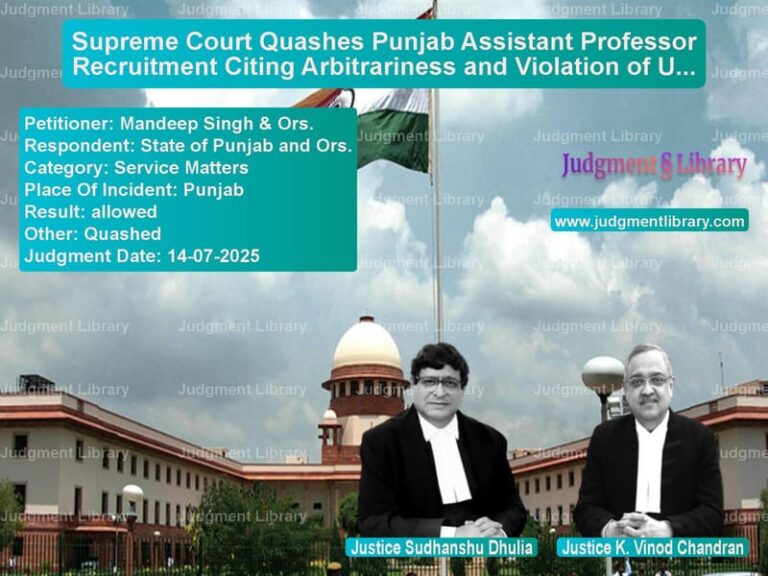Sentencing in Criminal Cases: State of Himachal Pradesh vs. Nirmala Devi
The case of State of Himachal Pradesh vs. Nirmala Devi is a significant ruling concerning sentencing under the Indian Penal Code (IPC). The Supreme Court had to determine whether the High Court was justified in altering the sentence of imprisonment into a fine in a case involving serious offenses under Sections 328, 392, and 307 IPC.
The background of the case involves an incident that occurred on August 22, 2000, where the complainant, Ramesh Kumar, was deceived, drugged, and robbed by the respondent, Nirmala Devi, and her accomplice, Krishan Lal Sharma. The prosecution successfully proved that the accused had administered an intoxicating substance to the complainant, robbed him of his money, and attempted to kill him.
Background of the Case
Ramesh Kumar, a resident of Preet Nagar, Jammu, intended to withdraw Rs. 27,000 from his bank to purchase an auto-tempo for his school business. On his way, he encountered Krishan Lal Sharma, an old acquaintance, who offered to assist him in purchasing the vehicle at a discounted rate. Ramesh Kumar accompanied Krishan Lal to his home, where he was introduced to Nirmala Devi. They offered him a drink, after which he felt dizzy and lost consciousness.
When Ramesh Kumar regained consciousness, he found himself in a hospital in Dalhousie. His money had been stolen, and he had sustained injuries. It was later revealed that the accused had abandoned him in a nullah, presuming he was dead. The police investigation led to the arrest of Krishan Lal and Nirmala Devi, and both were charged under Sections 328, 392, and 307 IPC.
Legal Charges and Trial Court Judgment
The Sessions Court convicted Nirmala Devi under:
- Section 328 IPC: Administering an intoxicating substance to cause hurt.
- Section 392 IPC: Punishment for robbery.
- Section 307 IPC: Attempt to commit murder.
The court sentenced her to two years of simple imprisonment for each offense and imposed a fine of Rs. 2,000 for each count. The sentences were to run concurrently.
High Court’s Ruling
Nirmala Devi appealed the sentence in the High Court, arguing that she was a woman with three minor children, two of whom were mentally unsound. The High Court considered this as a mitigating factor and modified the sentence by setting aside the imprisonment. Instead, a fine of Rs. 30,000 was imposed, with a condition that failure to pay would reinstate the imprisonment sentence.
Supreme Court Appeal and Arguments
The State of Himachal Pradesh challenged the High Court’s decision before the Supreme Court, arguing that imprisonment was mandatory for the offenses committed and that the High Court had no legal authority to eliminate imprisonment altogether.
The Supreme Court considered the following legal issues:
- Whether the High Court had the power to remove the imprisonment sentence and substitute it solely with a fine.
- Whether the mitigating factors presented by the accused justified such leniency.
Supreme Court’s Judgment
The Supreme Court ruled that the High Court’s decision was incorrect. It reinstated the trial court’s sentence, emphasizing that the law mandates imprisonment for these offenses.
The court observed:
“Imprisonment is a mandatory component of sentencing for offenses under Sections 328, 392, and 307 IPC. The law explicitly states that an offender ‘shall be punished with imprisonment and shall also be liable to a fine.’ Therefore, a court cannot do away with imprisonment entirely.”
The court further elaborated on the principle of proportionality in sentencing:
“The punishment must be proportionate to the gravity of the offense. In cases involving serious crimes like robbery and attempt to murder, the deterrence principle must be upheld to maintain public confidence in the justice system.”
Key Legal Takeaways
- Sentencing under the IPC requires adherence to both imprisonment and fines where prescribed.
- High Courts do not have the authority to substitute imprisonment with only a fine where the statute mandates both.
- The principle of proportionality must be upheld in criminal sentencing.
- Mitigating circumstances, such as the accused’s family responsibilities, cannot override statutory sentencing requirements.
Conclusion
The Supreme Court’s ruling in this case reaffirms the fundamental principles of criminal sentencing. The decision highlights the necessity of following statutory mandates in imposing punishment and ensures that leniency does not undermine justice. The accused, Nirmala Devi, was ordered to serve her sentence as per the original trial court decision, reinforcing the principle that judicial discretion must operate within the framework of the law.
Don’t miss out on the full details! Download the complete judgment in PDF format below and gain valuable insights instantly!
Download Judgment: State of Himachal Pr vs Nirmala Devi Supreme Court of India Judgment Dated 10-04-2017.pdf
Direct Downlaod Judgment: Direct downlaod this Judgment
See all petitions in Bail and Anticipatory Bail
See all petitions in Fraud and Forgery
See all petitions in Attempt to Murder Cases
See all petitions in Judgment by A.K. Sikri
See all petitions in Judgment by Ashok Bhushan
See all petitions in allowed
See all petitions in supreme court of India judgments April 2017
See all petitions in 2017 judgments
See all posts in Criminal Cases Category
See all allowed petitions in Criminal Cases Category
See all Dismissed petitions in Criminal Cases Category
See all partially allowed petitions in Criminal Cases Category







